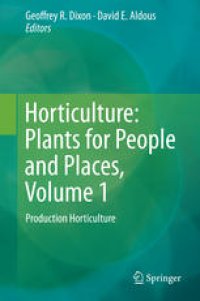
Ebook: Horticulture: Plants for People and Places, Volume 1: Production Horticulture
- Tags: Agriculture, Food Science, Environment general, Business/Management Science general, Social Sciences general, Humanities general
- Year: 2014
- Publisher: Springer Netherlands
- Edition: 1
- Language: English
- pdf
This Trilogy explains “What is Horticulture?”. Volume one of Horticulture: Plants for People and Places describes in considerable depth the science, management and technology which underpins the continuous production of fresh and processed horticultural produce. Firstly, there is a consideration of technological innovation derived from basic scientific discoveries which has given rise to entirely new industries, markets, novel crops and changed social habits. Then follows accounts of the modern production of: Field Vegetables, Temperate Fruit, Tropical Fruit, Citrus, Plantation Crops, Berry Crops, Viticulture, Protected Crops, Flower Crops, New Crops, Post-harvest Handling, Supply Chain Management and the Environmental Impact of Production. Each chapter is written by acknowledged world experts. Never before has such an array of plentiful, high quality fresh fruit, vegetables and ornamentals been available year-round in the World’s retail markets. Horticulture gives consumers this gift of nutritious, high quality, safe and diverse fresh foods. This is achieved by manipulating plant growth, reproduction and postharvest husbandry. The multi-billion dollar international industry achieving this is Production Horticulture the subject of this informative book.
Volume one of Horticulture – Plants for People and Places describes how the array of plentiful, high quality fresh fruit, vegetables, and ornamentals supplied to retail consumers is achieved. This feat demands the intensive manipulation of plant growth, reproduction and postharvest husbandry across the globe. International Production Horticulture operates in a free market arena, delivering produce rapidly, safely and reliably for increasingly demanding and discerning consumers. Internationally acknowledge experts describe the science, management and technology which underpins the continuous production and distribution of horticultural produce. The first chapter describes how basic scientific discoveries are continuously applied forming new industries, novel products and influences social practices and behaviour. There follows chapters describing the production of:- Field Vegetables, Temperate Fruit, Tropical Fruit, Citrus, Plantation Crops, Berry Crops, Viticulture, Protected Crops, Flower Crops, Developing New Crops, Post-harvest Handling, Supply Chain Management, and the Environmental Impact of Production. Crop Production Horticulture supports the economic welfare of countries across the World. Its particular impact in Africa is highlighted in the final chapter of this book.
Intensive plant production offers enormous economic and social benefits for coming generations particularly as urbanization accelerates. Production Horticulture is an international business centred on partnerships between science, technology, commerce and management. The discipline is based in the physical, chemical, and the biological sciences and integrates natural resources in partnership with others such as economics and engineering. Environmentally careful and sustainable husbandries now form the cornerstones of Production Horticulture. Considerable intellectual and scientific rigour and a strong command of practical business realities are demanded of those who work in this discipline. The contents of this valuable book provide a basis for acquiring these talents.